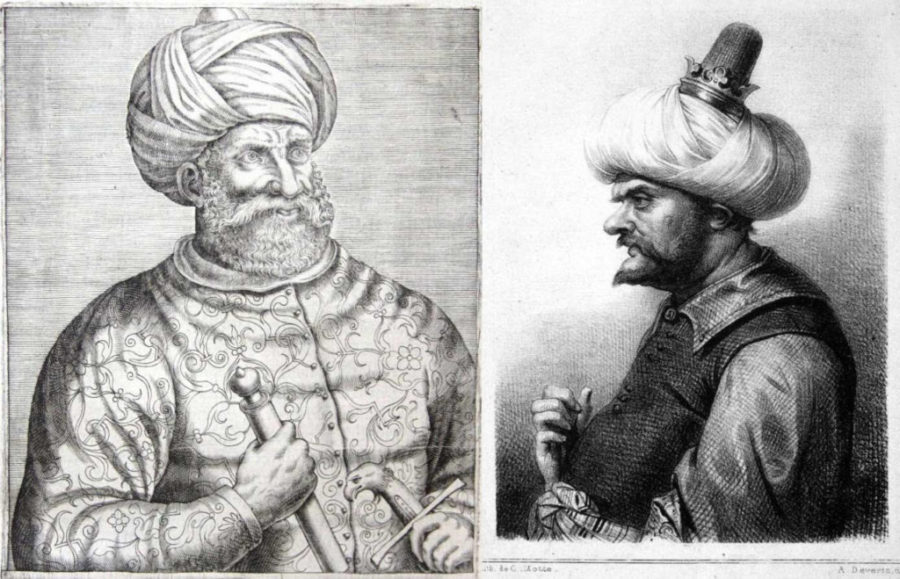
How three corsair brothers kept the Mediterranean at bay
In the 15th-16th centuries, three corsair brothers from the Ottoman Empire dominated the Mediterranean Sea, one of whom became the prototype for numerous legends and literary works of European authors.
In the army of Sultan Mehmed II, who participated in the conquest of Lesbos in 1462, there was a warrior (sipahi) named Yakub-aga. After completing his military service, he settled on this island, and the village of Bonova was given to him. He married a woman named Katerina, according to some sources, the widow of an Orthodox priest, and he had 4 sons: Iskhak, Oruch , Khizir and Ilyas.

Source: vseprotunis.ru
The brothers received a good education, they knew Italian, Spanish, French and the Greek languages, and began to engage in maritime trade. During one of the voyages, the ship of Oruch and Ilyas was attacked by the Rhodes knights-Ioannites, the younger brother was killed, and the older one was captured. He managed to escape 3 years later, then, becoming a corsair, he entered the service, first to the Mamluks, and then to the son of Bayezid II, Shehzade Korkut, who made him the captain of several ships. Taking his brother Khizir as a companion, Oruch-Reis, as he was called, attacked the ships of Europeans and raided cities on the European coast. The brothers received rich booty, and their fame resounded throughout the Mediterranean. Remembering how he lived during his captivity, Oruch-reis tried to help those who fell into the hands of the knights of Rhodes, ransomed the prisoners with his own money and gave them freedom. The brothers also spent part of their spoils on helping those in need. In 1509 their elder brother Ishaq joined them. In 1513 Oruch-Reis conquered the island of Djerba, which he made his base. The capture of two large galleys belonging to the Pope made him famous throughout Europe.

Monument to Ilyas-Reis in Ayvajik (Turkey) / Source: tripadvisor.com
In 1516, the three brothers managed to free Jijel and Algeria from the Spaniards, they took control of the cities and the surrounding areas, forcing the previous ruler Abu Hammu Musa III from the Zayanid dynasty to flee. During the siege of the port city of Bejaya, Oruch-Reis was wounded in his left arm. On the recommendation of doctors, he had to undergo amputation. It is said that he fitted an iron hook instead of a hand. Oruch- Reis declared himself Sultan of Algeria. But he understood that he would not be able to resist the Spaniards, who sought to return their possessions back. Therefore, in 1517, the navigator offered Algeria to the Turkish Sultan. The Sultan accepted his offer, Algeria became a Sanjak (province) of the Ottoman Empire, and Oruch Reis was appointed Bey (Governor) of Algeria and Beylerbey (Chief Governor) of the Western Mediterranean. In addition, the Sultan promised to support him with janissaries, galleys and cannons.

Oruch Bey captures the galley / Source: en.wikipedia.org
After the Reconquista, Oruch-Reis, together with his brothers, transported a large number of Moriscos and Marrans, Muslims and Jews from Spain to North Africa, for which he was nicknamed Baba Oruch or Father Oruch. In addition, the brothers sought to provide refugees with housing, food and other assistance in their new homeland. According to one version, from the distortion of the nickname Baba Oruch, the name Barbarossa arose, which became another nickname for Oruch-reis.

Oruch-reis / Source: tr.wikipedia.org
Oruch Reis and his brother Ishaq died in 1518 while defending Tlemcen from the Tlemcen Emir, who received help from the Spaniards. The Spaniards cut off the head of the corpse, put it in a bag of honey and took it to Spain to present to the king as proof of the death of the corsair . And the headless body of Oruch-Reis was taken to the city of Algeria and buried in the tomb of Sidi Abdurrahman , one of the national saints of Algeria, near the mosque of the same name. Today this mausoleum is used as a school for children learning Arabic. In 2018, a monument to Oruch Reis was inaugurated in the city of Ain Temushente in Algeria.

Monument to Oruch Reis in Ain Temushente (Algeria) / Source: en.wikipedia.org
The last surviving brother, Hızır or Hayruddin Barbarossa, inherited the title of his brother, his name, the Navy and became the most powerful and famous Ottoman admiral, ensuring the domination of the Turks in the Mediterranean Sea in the XVI century.

Khizir Reis / Source: tr.pinterest.com
Islamosphere

